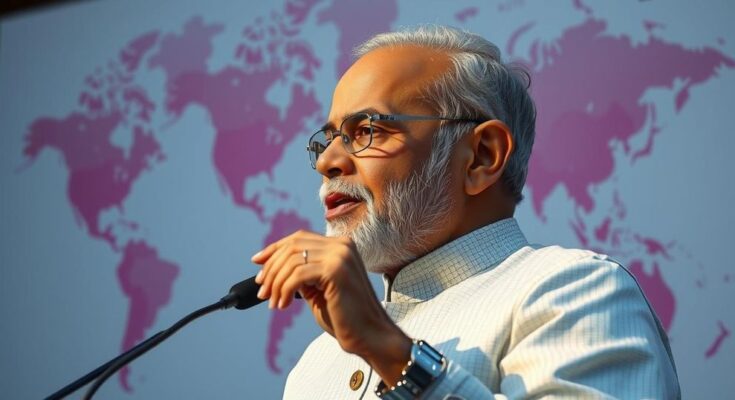Prime Minister Narendra Modi called upon the Indian diaspora during the “Hala Modi” event in Kuwait to aid in transforming India into a developed nation by 2047. He highlighted India’s potential in innovation, green energy, and collaboration, while acknowledging the crucial contributions of the Indian community in Kuwait. Modi emphasized the need for skill development and the importance of bilateral ties to realize shared developmental goals.
During his address to the Indian diaspora at the “Hala Modi” event in Kuwait, Prime Minister Narendra Modi urged overseas Indians to actively participate in the transformation of India into a developed nation by 2047. He highlighted India’s aspirations to become a global hub for innovation, green energy, and electronics, leveraging its youthful population to meet the growing demand for skilled labor. Modi emphasized the age-old relationship between India and Kuwait, which should serve as a foundation for future collaboration.
Modi, who is the first Indian Prime Minister to visit Kuwait in over four decades, acknowledged the significant contributions of the Indian community in Kuwait, which numbers over one million. He noted that Indian professionals are integral to the development of Kuwaiti infrastructure and education systems. By promoting the “Vishwa Bandhu” philosophy, India is positioning itself as a benevolent partner on the global stage, with recent pacts to facilitate labor migration highlighting a commitment to skill development.
In his remarks, Modi cited India’s advancements in various sectors, including technology, infrastructure, and sustainability, asserting that India is now the fifth largest economy in the world and a leader in fintech and startups. He drew parallels between India’s goal of “Viksit Bharat” with Kuwait’s “New Kuwait” aspirations, suggesting ample opportunities for cooperative ventures between the two countries.
The Prime Minister also visited a labor camp housing Indian blue-collar workers, indicating his dedication to their welfare, particularly following the tragic fire incident last June that caused multiple fatalities among Indian expatriates. This visit underscores the Modi administration’s focus on improving the lives of Indian workers abroad through various technology-driven initiatives.
In his engagement with notable figures, including translators of Indian epics into Arabic, Modi acknowledged the global appreciation of Indian culture. He also expressed admiration for Mangal Sain Handa, a centenarian former Indian Foreign Service officer, underlining the significance of historical ties in enhancing India’s stature abroad.
The Indian diaspora represents a vital segment of India’s global presence, significantly contributing to the country’s economic and cultural outreach. With over a million Indians residing in Kuwait alone, the ties between the two nations have historical roots that date back many years. The current focus from Indian leadership emphasizes not just the welfare of expatriates but also the strategic role they play in India’s development goals. As India aims for an ambitious transformation by 2047, the diaspora is seen as an essential ally in this journey, particularly in sectors like technology and green energy where India is poised to excel.
In conclusion, Prime Minister Modi’s call to the Indian diaspora reflects a strategic initiative to harness their potential in achieving national development goals. By fostering collaboration with countries like Kuwait, India aims to leverage its human resources to cultivate a sustainable and innovative future, positioning itself as a global leader by 2047. Modi’s engagement with expatriates underscores the bidirectional relationship that benefits both India and its diaspora, advocating for mutual growth and prosperity. Moreover, the emphasis on worker welfare highlights an ongoing commitment by the Indian government to support its citizens abroad, reinforcing the importance of Indian communities worldwide in India’s global narrative.
Original Source: www.hindustantimes.com




